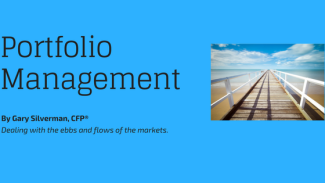
Portfolio Management: Beating "the market" not a goal
By Gary Silverman, CFP®
Last week, I introduced some pearls of wisdom I’ve learned over the years when it comes to managing an investment portfolio. Today I want to talk about beating the market. That’s the whole point, isn’t it?
Well, no.
Instead, I tell clients to never expect a stock, bond, or mutual fund that we recommend to go up quickly. It may, but they shouldn’t expect it. We will often get into an investment well before it begins moving up. This is not because we want an investment to stagnate (or go down). Rather, it is because we don’t know how to figure out exactly when a stock or the market as a whole will go up.
We don’t think anyone does.
Instead, we look for those stocks, bonds, and mutual funds that will, on average, give a good return over our clients’ designated time period, which may be five, ten, or thirty years down the road. This is why we do not seem rattled when an investment has gone down. It is not that we like taking losses. Rather it is because we realize that investing takes time and patience.
The year-to-year variations in the market are not what interest me. What I concentrate on is creating a portfolio that has a high probability of achieving its goals. This includes keeping its volatility to a level that the clients can live with, so that they don’t abandon the course due to bumps in the road.
That’s why we don’t see “beating the market” as a goal we strive toward. We do not measure ourselves against a market benchmark. What we concern ourselves with are our clients’ goals…both short-term and long-term. Our first consideration in portfolio design is to produce the return over time that our clients need, keeping the risk below what they can stand. Whether we beat the market or it beats us is immaterial.
I think you should have the same attitude when you manage your portfolio.
Part of this is because there is no “the market.” Rather there are many markets. There’s the stock market, the bond market, the real estate market, the commodities market, the fish market, etc. And it doesn’t stop there. For within the stock market there is the U.S. market, the established foreign market, and the emerging foreign market. And within the established foreign market there is the Euro-denominated market, the Japanese market, the Canadian market, and the British market, to name a few. Not only do I not think it wise to pick “a” market to compare yourself against, I’m not even sure which “the” market that should be.
And since a well-diversified portfolio is…well…diversified, then it stands to reason if you follow my guidance you would not have all your money in a single market. And if that’s the case you are guaranteeing yourself that several of the many markets will outperform you. That’s not a problem, that’s expected, and not something you should worry about.
Gary Silverman, CFP® is the founder of Personal Money Planning, LLC, a Wichita Falls retirement planning and investment management firm and author of Real World Investing

